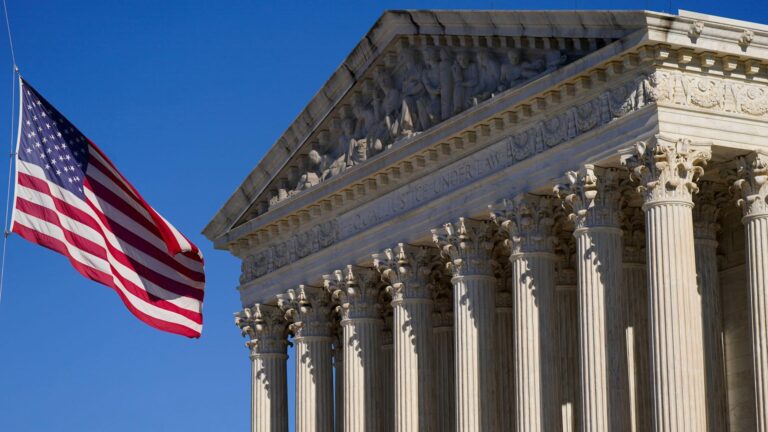The Supreme Court has declined to hear a case brought by conservative activist Laura Loomer, effectively rejecting her bid to sue major social media platforms over her bans. Loomer, known for her provocative online presence, argued that her First Amendment rights were violated when platforms like Twitter and Facebook suspended her accounts. The court’s refusal to take up the case marks a significant moment in the ongoing debate over free speech and content moderation on digital platforms.
Supreme Court Declines to Hear Laura Loomer’s Social Media Lawsuit
The United States Supreme Court has officially declined to hear the appeal filed by Laura Loomer, a conservative activist and social media personality, concerning her bans from several major platforms. Loomer challenged the decisions by these companies to restrict her accounts, arguing that such actions violated her First Amendment rights. However, the court’s refusal effectively upholds the existing legal framework that social media companies are private entities with the right to moderate content as they see fit without government interference.
Experts note that this decision emphasizes the ongoing legal distinction between government censorship and private platform policies. Key points from the ruling include:
- Private company rights: Platforms retain control over user content according to their community guidelines.
- First Amendment limits: The clause protects against government censorship, not actions by private entities.
- Precedent maintained: Previous rulings favor platform moderation autonomy without public forum obligations.
| Platform | Action Taken | Reason Cited |
|---|---|---|
| Permanent Ban | Policy Violations | |
| Account Suspension | Hate Speech | |
| Content Removal | Community Standards |
Legal Experts Examine Implications for Section 230 and Free Speech Online
The Supreme Court’s decision to reject Laura Loomer’s lawsuit has reignited debate among legal scholars about the protection social media platforms receive under Section 230 of the Communications Decency Act. This legal provision has long been a cornerstone in preserving internet free speech by shielding online platforms from liability over user-generated content. However, critics argue that platforms’ moderation actions, like suspensions and bans, walk a fine line between content curation and censorship, raising questions about the limits of these protections in an era of growing political polarization.
Experts emphasize several key points that have surfaced in this case:
- Section 230’s scope: It grants broad immunity but does not apply in cases where platforms act as publishers with editorial discretion.
- Free speech vs. platform autonomy: Balancing user rights with a platform’s ability to enforce community standards remains complex.
- Future legal challenges: The ruling could influence upcoming cases challenging the boundaries of content moderation and liability.
| Aspect | Legal Implication | Potential Impact |
|---|---|---|
| Section 230 Immunity | Shields platforms from most lawsuits | Platforms maintain moderation freedom |
| Content Moderation | Considered editorial discretion | Limits users’ ability to sue |
| Free Speech Claims | Constitutionally protected speech debated | Possible future legislative reform |
What Social Media Users and Content Creators Should Know Moving Forward
In the evolving landscape of digital expression, this Supreme Court decision reinforces the autonomy of social media platforms to moderate content without fear of litigation. Users and content creators alike must recognize that private companies have the right to enforce their community standards and user agreements, even if it leads to the removal or banning of controversial figures. This ruling signals that legal protection for free speech does not extend to forcing platforms to host all voices indiscriminately, highlighting the necessity to engage responsibly within established guidelines.
For content creators, understanding platform policies has never been more crucial. Here’s what to keep in mind going forward:
- Policy Compliance: Regularly review terms of service to avoid content that could lead to sanctions or bans.
- Alternative Platforms: Diversify presence across multiple social media to mitigate risks of deplatforming.
- Community Impact: Build trust through respectful engagement to maintain audience support and platform favor.
- Legal Awareness: Stay informed about legal rulings that affect content moderation and user rights online.
| Aspect | What Users Should Do |
|---|---|
| Content Strategy | Align with platform standards |
| Platform Choices | Engage on diverse networks |
| Community Relations | Foster positive interactions |
| Legal Literacy | Monitor evolving court rulings |
To Conclude
The Supreme Court’s decision to reject Laura Loomer’s bid marks a significant moment in the ongoing debate over free speech and the power of social media platforms. As courts continue to navigate the complexities of online expression and platform policies, this ruling underscores the challenges conservative activists face in seeking legal recourse for content moderation decisions. The case leaves open broader questions about the balance between protecting free speech and allowing private companies to enforce community standards in the digital age.




